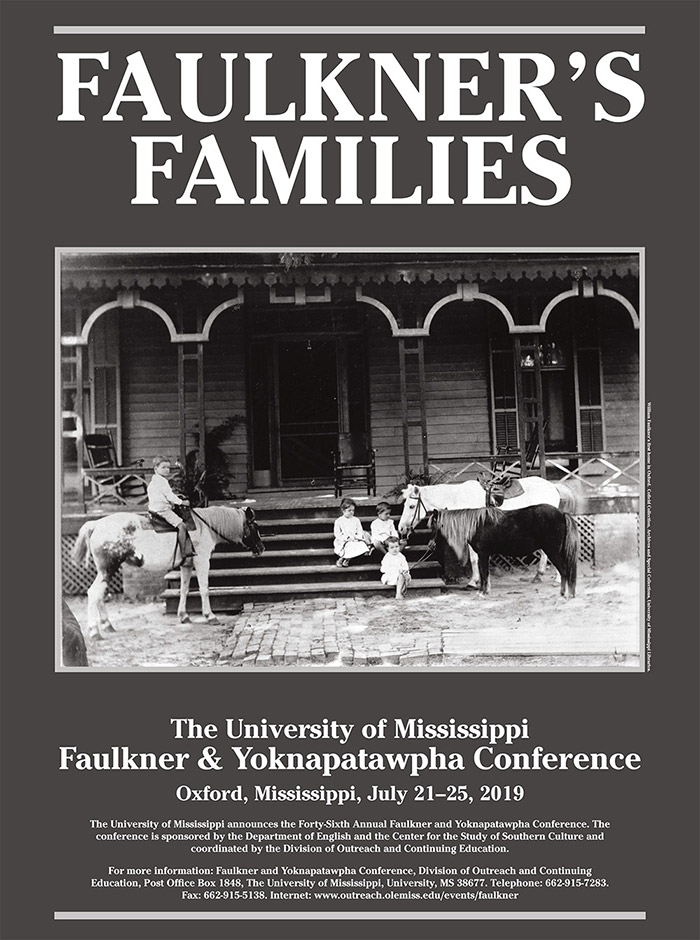
Panel. Family as Fate and Fantasm
Location
Oxford Depot
Start Date
23-7-2019 5:30 PM
Description
- Fiends, Fauns, and Fantasms: Finding Family in Faulkner’s Supernatural / Kristi Rowan Humphreys, Baylor University
This study analyzes Faulkner’s “undead” and “supernatural” families in the screenplay Dreadful Hollow and the stories “Beyond” and “Black Music,” through the lens of the family sacrifice and obligation that were very real aspects of Faulkner’s own experiences.In “Beyond,” the Judge sacrifices any hope of heaven so that he can lie next to his son; in “Black Music,” Wilfred abandons the only existence he has ever known so that his wife can live in luxury; and in Dreadful Hollow, Julian sacrifices her own comfort for the needs of her family. Reading Faulkner’s supernatural stories from a perspective of family obligation and sacrifice adds an important layer to their interpretations because it grounds what is “beyond the lot and plan for mortal human man” in the realities of human experience. - Childhood and Destiny: Encountering Fate in Faulkner's Fiction / Maude Hines, Portland State University
- Brides of Death: Freedom and Fate in Faulkner’s Tragic Families / Anne MacMaster, Millsaps College
A focus on an aristocratic household—-the oikos—-is part of the tragic form, according to Aristotle, and violence, deliberate or otherwise, is more likely to be tragic if committed against a closely related person, such as a family member. Lessons learned from Aeschylus, Sophocles, and Euripides undergird theme and action in both The Sound and the Fury and Absalom, Absalom! – Faulkner’s two novels in the tragic mode. In these tragic novels, as in the Attic plays that Rush Rehm studies in Marriage to Death, “the conflation of weddings and funeral . . . sheds particular light on women” (8), and we can apply Rehm’s observations about Greek tragic characters to Caddy, Judith, and to other of Faulkner’s characters who become brides of death: “The dramatic power and appeal of many of these heroines arises from their being engaged in, committed to, or trapped by a ‘marriage to death’” (Rehm 8).
Relational Format
Conference proceeding
Recommended Citation
Humphreys, Kristi Rowan; Hines, Maude; and MacMaster, Anne, "Panel. Family as Fate and Fantasm" (2019). Faulkner and Yoknapatawpha Conference. 20.
https://egrove.olemiss.edu/fy/2019/schedule/20
COinS
Jul 23rd, 5:30 PM
Panel. Family as Fate and Fantasm
Oxford Depot
- Fiends, Fauns, and Fantasms: Finding Family in Faulkner’s Supernatural / Kristi Rowan Humphreys, Baylor University
This study analyzes Faulkner’s “undead” and “supernatural” families in the screenplay Dreadful Hollow and the stories “Beyond” and “Black Music,” through the lens of the family sacrifice and obligation that were very real aspects of Faulkner’s own experiences.In “Beyond,” the Judge sacrifices any hope of heaven so that he can lie next to his son; in “Black Music,” Wilfred abandons the only existence he has ever known so that his wife can live in luxury; and in Dreadful Hollow, Julian sacrifices her own comfort for the needs of her family. Reading Faulkner’s supernatural stories from a perspective of family obligation and sacrifice adds an important layer to their interpretations because it grounds what is “beyond the lot and plan for mortal human man” in the realities of human experience. - Childhood and Destiny: Encountering Fate in Faulkner's Fiction / Maude Hines, Portland State University
- Brides of Death: Freedom and Fate in Faulkner’s Tragic Families / Anne MacMaster, Millsaps College
A focus on an aristocratic household—-the oikos—-is part of the tragic form, according to Aristotle, and violence, deliberate or otherwise, is more likely to be tragic if committed against a closely related person, such as a family member. Lessons learned from Aeschylus, Sophocles, and Euripides undergird theme and action in both The Sound and the Fury and Absalom, Absalom! – Faulkner’s two novels in the tragic mode. In these tragic novels, as in the Attic plays that Rush Rehm studies in Marriage to Death, “the conflation of weddings and funeral . . . sheds particular light on women” (8), and we can apply Rehm’s observations about Greek tragic characters to Caddy, Judith, and to other of Faulkner’s characters who become brides of death: “The dramatic power and appeal of many of these heroines arises from their being engaged in, committed to, or trapped by a ‘marriage to death’” (Rehm 8).

